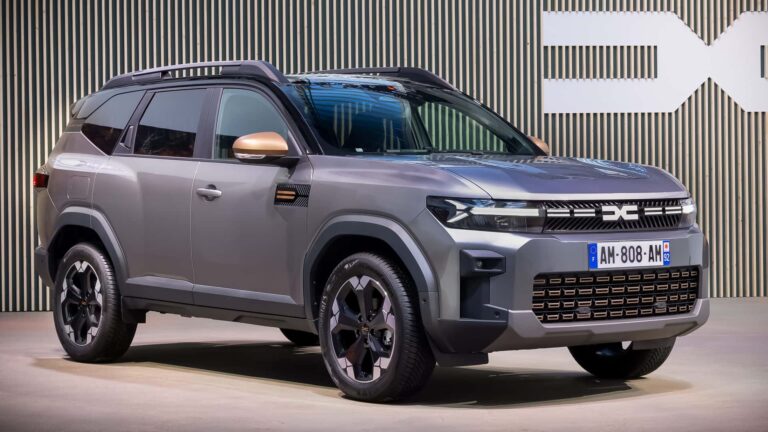It’s safe to say Dacia is on a roll. The Sandero is Europe’s best-selling car so far this year, well ahead of the once all-conquering Volkswagen Golf. In addition, the Duster is dueling the Tiguan for sixth place. With the Bigster, Renault’s low-cost division wants a larger piece of the pie by dipping its toes into C-segment territory. Unimaginative name aside, the company’s biggest vehicle ever is shaping up to be a solid product.
Dacia calls it a completely new vehicle but we’re seeing a Duster XL. Essentially, it’s a production version of the 2021 Bigster concept, and dare we say it looks smart for a budget-friendly SUV. Pricing isn’t available yet but Dacia models tend to be the cheapest cars in their respective segments.
It’s still only a five-seater but more spacious and with extra toys onboard. At 180 inches (4.57 meters) long, the Bigster lives up to its name by being significantly larger than a Duster. It’s 71.2 inches (1.81 meters) wide, and 67.3 inches (1.71 meters) tall, with a slightly longer wheelbase of 106.2 inches (2.7 meters) for what is Dacia’s first true C-segment model.
With 19-inch wheels and two-tone paint jobs, this isn’t the spartan-spec Dacia you might remember. Fancy features include an electric tailgate, a panoramic sunroof, wireless smartphone charging, adaptive cruise control, and an electrically adjustable driver’s seat. The Bigster also combines a 10-inch digital driver’s display with a 10.1-inch touchscreen while dual-zone AC is also offered.
The powertrain lineup is impressively diverse for a no-nonsense SUV. Dacia discontinued diesels a few years ago but the Bigster has an efficient hybrid setup instead. It’s actually the first vehicle from the Renault Group to use a Hybrid 155 configuration. It consists of a combustion engine, two electric motors, a 1.4-kWh battery pack, and an interesting automatic transmission with four gears for the ICE and another two for the e-motors.

The four-cylinder gas engine is good for 107 horsepower while one of the electric motors delivers an extra 50 hp. The other e-motor serves as the starter/generator. With this powertrain, the Bigster always starts in pure electric mode. Without providing exact figures, Dacia says the compact SUV runs in zero-emissions mode around town for as much as 80% of the time.
A less complex powertrain is the TCe 140 with a turbocharged 1.2-liter, three-cylinder engine benefitting from a mild-hybrid setup. It’s the first time a Dacia gets this ICE that runs on the Miller cycle and benefits from a mild-hybrid setup. The small three-pot engine is hooked up to a six-speed manual gearbox. Front-wheel drive is standard but a 4×4 setup is available.
Yes, the Bigster can be ordered with four-wheel drive and three pedals. This all-paw variant has hill descent control and selectable driving modes: Snow, Mud/Sand, Off-Road, Normal, and Eco. The Duster is a reputable SUV off the beaten path and its bigger brother should follow suit.

88 Photos
Dacia
If you’re after efficiency but not keen on getting the hybrid, there’s an ECO-G 140 with a three-cylinder 1.2-liter turbo engine. It’s been engineered to run on liquified petroleum gas and has a maximum driving range of 900 miles (1,450 kilometers). This is made possible thanks to 26.1 gallons (99 liters) of fuel, with 13.2 gallons (50 liters) of gasoline and 12.9 gallons (49 liters) of LPG stored in a tank underneath the cargo floor.
The Bigster is compatible with a few nifty accessories, including a double bed that takes less than two minutes to install once you fold the 40:20:40-split bench. It’s part of an optional Sleep Pack that also includes a storage table and dedicated cargo areas. If the luggage capacity of 23.5 cubic feet (667 liters) won’t suffice, there’s a roof rack that can take 176 pounds (80 kilograms). It’s installed on the modular roof rails that are positioned lengthways but can reconfigured transversely. Oh, there’s a tent, too.
If Dacia gets the pricing right, the Bigster could prove to be another popular product from the emerging Romanian brand. However, it’ll fight in an already crowded segment consisting of numerous well-established players. On sale since 2010, the Duster (no, not the Plymouth Duster) has managed to generate more than two million sales. The Renault-owned brand is confident it can repeat the Duster’s commercial success with its bigger brother. A diesel engine would increase those odds, but the Renault Group is waving goodbye to oil-burners by promoting hybrids instead.

81 Photos
Christopher Otto
The Bigster celebrates its public debut at the 2024 Paris Motor Show next week. Pricing will be announced in January 2025, and sales will kick off in April. Logic tells us it’ll command a premium over the Duster, available in Germany from €18,950 ($20,800) to €22,150 ($24,300).
That might not seem much of a bargain compared to some compact crossovers sold in America but keep in mind Europeans pay value-added tax. In Germany, VAT is 19%. It’s even higher in other countries, reaching 27% in Hungary. Croatia, Denmark, Norway, and Sweden are not far behind, at 25%.
Read the full article here

